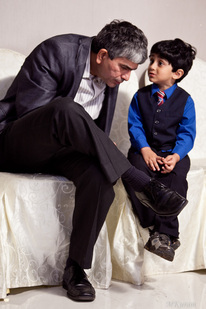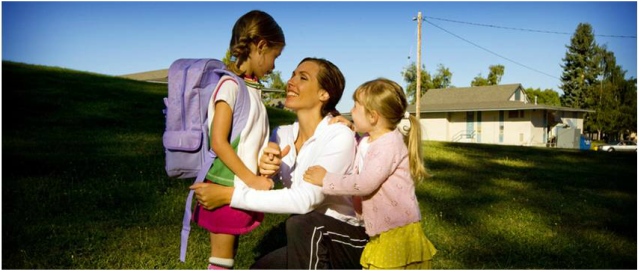|
By Joyce Suttin
Bo was our golden lab who loved to swim in our pool. He lived for his exercise, and the pool was his domain. One day, my son was learning new strokes and tried the dead man’s float. Bo decided his boy was in imminent danger and jumped into the pool to rescue him. Instinctively, he pushed my son’s head up and held onto him with his paws in an effort to save his life. My poor son choked and sputtered as he tried to keep Bo away and ended up with water in his lungs and a chest full of scratches. I praised Bo as he shook water all over me in his zealousness to get my opinion of the event. I knew that he’d accomplished more harm than good, but I could relate, because I know I’ve often done the same thing in my interactions with others. I was talking with someone the other day about their relationship with their teenager and offered my advice. After forty-some years of parenting, grand-parenting, and teaching teenagers, my wisdom was really quite simple: “Don’t take things personally.” It’s hard not to react with annoyance, anger, or sensitivity when you feel like you are being rebuffed. It’s hard not to take unkind words or actions personally, not to think of all the times when there were other things you wanted to do, but you stopped and listened and attended to your kids’ needs. It’s hard to stand on the edge of the proverbial pool and watch and pray, knowing you have said all that needs to be said and done what you could. Now is the time to just step back a bit and let them try. Let them make the clumsy dive. Let them try the new strokes. Let them imitate their friends. But don’t jump into the pool like Bo and try to rescue them prematurely. Just watch and wait in case they call for help. And pray. Because in the end, prayer and unconditional love are really what will make a difference. If they eventually call out to you, don’t berate them for all the times they didn’t. If they knock on your door, don’t tell them you’re too busy. Be the anchor. Be the rock. Be the stable place in the unstable world and let them know that things will be all right. Then treasure that moment with your arms around them again, and give them faith to jump back in the pool. Joyce Suttin is a retired teacher and writer and lives in San Antonio, USA.
Text and image courtesy of Activated magazine.
0 Comments
By Curtis Peter van Gorder
Not so long ago, the various members of our family had different schedules, and as a result, we were seldom able to eat together. I couldn’t help feeling that our family was drifting apart—especially since visiting an Italian friend who taught me what a joy “breaking bread” together can be. A meal in an Italian home is an event. It’s not about grabbing a quick bite on the run; rather, it’s a time to swap stories, to chat, to debate, to share hopes and wishes. Then, just when you think the meal is finished, another delicious dish is set in front of you. Before you know it, two hours have gone by, and maybe many more. No need for any other evening entertainment; the meal is an event in itself. We may not often have the opportunity to indulge in an Italian-style feast, but even in our busy lives, surely we can find a way to share a meal. There is a lot of research that supports the benefits of families eating together. The opportunity to talk over a meal strengthens bonds, creating warmth, security, and a sense of belonging. A home-cooked meal is likely to be more nutritious and cheaper than fast food. Younger members of the household learn manners—asking to pass food, not putting elbows on the table, and eating slowly all contribute to the pleasant experience. Language skills are reinforced as we listen and tell stories around the table. Eating together also increases the whole household’s awareness of food preparation—another great way of giving the children a good start in life. No matter the composition of your household, taking time to stop and enjoy your food is going to be good for your digestion and emotional well-being. Meals are also a great time to pray for our specific needs and show appreciation to God for what He’s done. My visit to Italy has inspired me to commit to calling our family together at mealtimes as often as possible. What we get is a lot more than just the food. We receive bonds of love, joy, and togetherness that will last.
Courtesy of Activated magazine. Used with permission. Photo: More Good Foundation via Flickr.
Disabilities cover a wide range. Some are obvious—such as a child with a physical disability who uses a wheelchair, or a child with a visual impairment who uses a cane to navigate when walking. Other disabilities may be more “hidden”—for example, children who have learning disabilities or autism spectrum disorder. Chances are that at some point your child will have a classmate with a disability. Just as you guided your very young child when he or she began to befriend others, you can encourage your child to learn about and be a friend to children who have special needs. Basic ideas to share with your child
Try to use clear, respectful language when talking about someone with special needs. For a younger child, keep explanations simple, such as, “She uses a wheelchair because a part of her body does not work so well.” Reinforce with your child that namecalling— even if meant as a joke—is always unacceptable as it hurts people’s feelings. Getting to know children with special needs Paradoxically, when it comes to approaching someone with a disability, children may be better at it than their parents because they are less inhibited. Some adults—especially those without previous exposure to people with special needs—may be more timid. Worried about appearing intrusive or insensitive, they may not know what to say or do. “The other kids are great,” [Jasmine’s] mom says, “They are very direct, which is good. They like her and want to interact with her.” However, if your child (or you, for that matter) is unsure about approaching a child with a disability, here are some helpful tips:
Learning more about special needs Reading or learning about a disability is a great way to further understand a child’s experiences. It may also help dispel any questions you or your child may have. Your local library and librarian can be a great resource for finding age-appropriate books and materials. Deborah Elbaum, M.D. is a parent of three children and lives in Massachusetts. She is a volunteer for the disability awareness program taught at her children’s school. Article courtesy of Motivated magazine. Used with permission. Photo in public domain.
Dr. Bob Pedrick "Daddy, where does the light come from?" Billy had just switched on the lamp by his bed. Now he looked at his father with wide, questioning eyes. The question was a serious one for a seven-year-old. His father answered by describing in simple terms how the bright light of the sun pulls the water from the ocean into the sky. It then falls as rain in the mountains. He went on to describe the giant water wheels that capture the power of rushing water and change it into invisible streams of electric energy. This energy passes swiftly through miles and miles of wire until it reaches the light bulb, which, almost magically, can turn the invisible power back into light. After a few more questions, Billy's eyes lit up and his face broke out in an "I see" kind of smile. A choice moment had arrived, more awesome than the miracle of electricity. A portion of knowledge from the father's head had been transferred to Billy's brain. When we, as parents, send verbal messages that are received and assimilated by our children, it makes each of us glow a little. We could call this happy phenomenon turning on the light bulb inside our child's head. Unfortunately, the circuits for this kind of communication have a way of getting short-circuited. The father could have heard the question as another attempt by Billy to delay his bedtime. A response such as "No more silly questions. You've been up too long already" would have quickly blanked out the circuit and snipped off a promising tendril of inquiry into the unknown. More important, it would have broken another connection for real communication between child and parent. Of course, the same question in another context might well have been only manipulative on the part of the child, but the difference can be discovered by an alert adult. One key ingredient in this light bulb dialogue was that Billy wanted to hear what his father had to say. While this is characteristic of early childhood—when parents are the source of most knowledge and children absorb new ideas like a blotter soaks up water—this openness to parental input seems to lessen with each passing year. Instead of our parental wisdom lighting a bulb inside our children's heads, it seems as if their ears are plugged with wool. What we say bounces off, seemingly unheard. We wait in vain for any positive reaction. Finding a formula for popping the wool out of our children's ears gives promise of appreciably reducing the tension in many households. The practice of responding to family situations with verbal attacks upon the worth of the other person is an easy trap to fall into. It is so easy to tell other people how to avoid falling into this adversary message trap. Right now I was brought up short. While writing this, my granddaughter burst into my study. "Gramps," she shouted, "come see the dog jump three feet in the air for a bone." My first inclination was to snap, "Can't you see I'm busy? Don't bother me now." Then, before the words left my mouth, the subject of this chapter hit me. I thought, If you can't practice it, don't write it. Jeannie and I spent ten happy minutes watching our aged dog act like a puppy again in exuberant response to the loving attention of a six-year-old. My first inclination to respond by saying, "Can't you see I'm busy?" would have been an adversary message, starting with "you" and implying that if Jeannie were half-bright, she would have had better sense than to interrupt me. This was not at all the message I wanted to send. In this instance it was possible and productive for me to take a ten-minute break and play with Jeannie and the dog. This is not always the case; sometimes circumstances prevent a positive response to a child's request. In such an instance, I could have said, "Jeannie, I must finish this job right now. We will have to wait until later to put the dog through her paces." Jeannie would have been disappointed, but she probably would have received it as an affirmative message rather than an adversary message. It would not have insulted Jeannie's self-worth at all but, instead, let her know my needs. Note that this affirmative message began with "I," not with "you." The emphasis is placed upon the sender's situation and needs, not the character or intelligence of the receiver. The needs of parents are important, so affirmative messages are a useful means of popping the wool from children's ears. In contrast, I remember some years ago when a situation with a far higher emotional threshold occurred at our dinner table. Jeff, like a lot of kids, insisted upon setting his milk on the edge of the table. Repeated warnings that he should move his milk to a safe position failed to do more than cause a temporary correction. We were in a hurry; I had a speaking engagement that evening. Of course, the inevitable happened: Jeff reached for the bread, and milk spilled all over the new carpet. My roar was probably heard two blocks away. All of the tension from a long, trying day was focused upon Jeff. He left the table in tears. "You clumsy idiot!" I shouted after him. "Why don't you listen when I tell you something?" A look around the table told me no one else had much appetite for finishing the dinner. In one way I felt better, because the outburst had released the tightness I had unconsciously been building up. Still, I felt guilty.—Guilty for venting my anger by overreacting to Jeff's indiscretion. And guilty for spoiling the family dinner. No amount of self-reassurance that I had been justified in correcting Jeff's carelessness could relieve my depression. Later, before he went to bed, I put my arm around Jeff and we talked about the episode. Then we were able to give respectful attention to each other's feelings. An exchange of "I'm sorry" and a good hug made the end much better than the beginning. In the years since Jeff was small enough to disrupt the dinner table, I have become fully convinced that there are inevitably destructive results to be expected from using adversary messages. They tear at a child's dignity. Unquestionably, Jeff needed to be corrected that evening. His thoughtless and disobedient behavior was unacceptable, and I would have done him a disservice by ignoring it. A better response would have been, "I am really furious; milk on the carpet makes an ugly stain and causes us a lot of unnecessary work." Then Jeff should have been given an opportunity to help clean up the mess. Haim Ginott's remarks on this subject, while they are directed at teachers, are just as applicable to parents: "An enlightened teacher is not afraid of his anger, because he has learned to express it without doing damage. He has mastered the secret of expressing anger without insult. Even under provocation he does not call children abusive names. He does not attack their character or offend their personality." An idea internalized by a child when he receives a parental correction is not always the same idea the parent wanted to get across. Often the emotion-packed insult wrapped around a message is received and believed. The child misses the parental intent completely. We, as parents, then say that the child might as well have his ears stuffed with wool for all he hears. This is not precisely true, for the insult ("You are a stupid slob!") is heard, while the message we want delivered ("This behavior is unacceptable.") is sidetracked. Words Count When words fail between parent and child, the youngsters are set adrift in a void with no tools at their disposal to express ideas and needs. The importance of using and not abusing language was recognized by the Biblical author James. He was deeply concerned about relationships between persons, and he laid great emphasis upon being genuine. For example, his advice was to be "doers of the Word, and not hearers only" (James 1:22). On the subject of communication he said, "Be quick to hear, slow to speak, slow to anger" (James 1:19). In these few words he summed up the whole idea of this chapter. James started by giving a plug for effective listening. Then he cautioned against speech before thought. His proverb was an older, more profound version of the popular quip, "Put your mind in gear before you open your mouth." It is good advice, especially for parents when tension builds and frustrations mount. Excerpted from the book "The Confident Parent" by Dr. Bob Pedrick.
 Dr. Bob Pedrick Coming home from college was usually a joyful occasion for Peggy Painter. But this time she felt a stomach-knotting fear, and each step from the bus stop deepened her anxiety. Peggy's parents were Christians and generally understanding. But the story she had to tell of an unwanted pregnancy, ended by abortion, would both shock and sadden them. Would they hear the anguish in her voice? Would they recognize all she had gone through? Or would they, in their own pain, lash out and condemn her? Peggy's story has a happy ending. Her parents listened. They heard; they felt. And their response showed that they understood her feelings and accepted her. For Peggy, it meant the beginning of a new life. Peggy's parents not only rekindled her smothered life but focused attention on her future opportunities rather than past failures. They exhibited what we call responsive listening--a process of listening with a person, not just to or about him. Responsive listening restrains the temptation to judge or give advice. Responsive listening helps a person clarify and communicate his feelings. It creates a climate of understanding, reduces defensiveness, and clears the way to positive changes in behavior. "I Want to Understand You" Responsive listening is not an easy skill to acquire. It takes practice. It means attaining some verbal dexterity. More important, it begins with a caring attitude. Responsive listening presupposes that parents really want to know what their children have to say. It does not necessarily mean agreeing with them. Rather, it is an attitude in which a parent says, "I want to thoroughly understand--and let you know I understand--what you say before I respond." Once the parent understands the message, he has the option to agree or disagree. The effectiveness of our hearing apparatus may get us into or out of trouble, but we're not talking about hearing. Listening is something else. Listening is how we comprehend and react to what we hear. Through extensive research, Xerox Corporation has discovered that most people operate at an efficiency level of only about 25 percent in general listening situations. If similarly low levels of attentiveness are typical of family relations, then many crises may well be traced to poor perceptions of what someone else said. Usually when our children come to us, we respond with some kind of verbal or nonverbal message, but the messages we send often do not achieve the desired results. As a result of his experience with parent training courses, one researcher found that over 90 percent of parental responses to children fall into one of twelve nonproductive categories: 1. Questioning 2. Judging 3. Lecturing 4. Ordering or commanding 5. Warning 6. Name calling 7. Sympathizing 8. Probing 9. Preaching 10. Advising 11. Agreeing 12. Withdrawing These twelve response categories often reap undesirable results, although there are always exceptions to this general rule. Children, parents and situations vary and cannot be handled in a "rulebook" fashion. Many times, however, these types of responses not only illustrate parent-child dialogue today but are similar to the responses Job's "comforters" gave him several thousand years ago. 1. Questioning: Bildad answers, "Who are you trying to fool? Speak some sense if you want us to answer!" (Job 18:2). Such unnecessarily aggressive questioning often triggers rebellious thoughts and behavior. 2. Judging: Eliphaz answers Job, "It is because of your wickedness! Your sins are infinite!" (Job 22:5). Such commonplace judgmental statements, if made to our children, can breed exaggerated attitudes of guilt, which can become permanently imbedded in their personalities. 3. Lecturing: Again Bildad tells Job, "Read the history books and see--the wisdom of the past will reach you" (Job 8:8,10). Lecturing often makes the unwilling recipient feel inferior, inadequate, or resentful. The good-old-days syndrome illustrated here is especially destructive to good family communication. 4. Ordering or commanding: Now Zophar replies, "Stem this torrent of words. Is a man proved right by all this talk?" (Job 11:2). Or, "Shut up!" If repeated often enough, this command can destroy mutual respect. 5. Warning: Bildad warns Job, "Your bright flame shall be put out" (Job 18:5). A warning is all too often an invitation for a child to test the firmness of the parent's resolve. Do you really mean it? The child will soon find out. 6. Name calling: Eliphaz taunts Job, "You give us all this foolish talk. You are nothing but a windbag" (Job 15:2). Want to destroy a child's self-image quickly? Start calling him names. The art of praise—what is known as positive reinforcement in the current psychological jargon—is an essential art for a parent or teacher to master... The teenagers who sit in my office tell me again and again, “My dad gets all over my case when I mess up at school, but when I bring home a good grade he acts as if it’s nothing—that I’m finally doing what I should have been doing all along.” Stop and think. How long has it been since you took a full 60 seconds to talk to your son or daughter about some fine thing they’ve just done? —Alan Loy McGinnis
*** A nurse ushered me into my grandma’s room. Lying in the hospital bed, she looked so small. Her eyes were closed. I sat down quietly. I was on my way to seminary and full of self-doubt. I had just given up a full scholarship to medical school, and everyone thought I was making a mistake. I desperately wanted Grandma’s advice, but the nurse had warned me that she didn’t have much strength left. After half an hour, Grandma hadn’t stirred, so I just started talking. Suddenly she woke up, asking, “Danny, is that you?” She told me how her faith had guided her all her life. After a few minutes, a great peace settled around us. I kissed Grandma and turned to leave, but then I heard her whisper some parting words. I leaned over to listen. “I believe in you,” she said. Grandma died that night, but in more than 20 years of work as a Christian psychologist, I have passed on her words many times. Four simple words can make a lifetime of difference. --Dan Montgomery *** The week before my father died, when I was a senior in college, he took me aside and showed me a box of clippings of newspaper and magazine articles he had written and hidden away. When I asked in surprise why he hadn’t shown me these before, he replied, “Your mother discouraged me from writing because I don’t have a college education, so I’ve done it in secret and she doesn’t know.” Mother had not meant to be a discourager, but she had stated what seemed an obvious fact to her: If you’re not educated, you shouldn’t write. My father had not let this attitude depress him, but he had “hidden his light under a bushel.” He told me he had written an article for the Advance magazine but it had not been published. “I guess I reached for something a little too big this time,” he shared. How touched I was that he had told me about his interest in writing and the article he had submitted to the Advance magazine! Within days my father dropped dead in a Boston subway station, and on the day of the funeral the new issue of Advance arrived—with his article published in it. Had he not confided in me, I would never have opened that issue. I have the framed article with my father’s picture hanging in my study, and each time I glance at it I wonder what that man might have become as a writer if only someone had believed in him. We live in a discouraging world full of people who put us down. What bright lights we can be when we say the simple words, “I have confidence in you!” —Florence Littauer From the bogeyman for small children to the bogies of SATs and final exams for the college-bound, stress affects kids of all ages. The first thing a parent can do to help their child manage stress is to build a strong family unit. Include your children in family discussions and be on the lookout for stress in your kids. Recognizing Stress in Children Especially small children with under-developed communication skills may display stress very differently than an adult does. Often kids’ stress is internalized and most noticeable in physical symptoms such as frequent flu-like symptoms including headache, stomachache, and even nausea. Children under stress may regress to behaviors like bedwetting, clinginess, and frequent crying. Behavioral symptoms may be extreme at both ends of a behavior spectrum. A normally active child becomes either listless or hyperactive, a usually docile child has fits of anger or a child that “acts out” becomes docile and introspective. Some signs of stress in kids are easily confused with children’s mental disorders. For instance, if schoolwork slides or your child’s circle of friends undergoes a drastic change, it isn’t a sure sign that your child is on drugs. Situations like these may simply indicate a child’s inability to handle a stressful situation. Helping Kids Reduce Stress Children primarily learn by example. The best way to teach your child how to manage stress is by using the tools and articles at Stress Management Tips to learn to effectively manage your stressors. In addition, you can develop skills and child-oriented stress management techniques to help your kids recognize and manage their stressors.
Text courtesy of Motivated magazine. Photo by Lotus Carroll via Flickr.
There is no magic formula for parenting, no secret recipe for success. Just as I am an imperfect parent, I will raise imperfect children. I must lean hard into Jesus and walk by faith, following Him as I parent. My goal needs to be faithfulness. Faith and faithfulness.--Erika Dawson * Successful parents enjoy being parents. They enjoy parenting not because it's easy or instantly rewarding, but because of the sheer joy and privilege of cooperating with God in shaping another unique and precious life. Any parent of grown children will tell you that “they grow up so quickly.” Successful parents remind themselves of that and try to savor every day with their children. They immerse themselves in their children as much as possible and just enjoy them—even the days of dirty diapers, illness, and disappointments. They don't just love their children, they like them and look forward to spending time with them. Successful parents don’t expect perfection, either from themselves or their children. Parenting is an art, not a science. Successful parents understand that, like themselves, their children aren't perfect either. This frees them to love their children unreservedly. Successful parents don’t fear occasional failures. They understand that mistakes are a normal, even healthy, part of parenting. They make the best decisions they can, and when they're wrong, they learn from their mistakes and try to do better the next time. Successful parents don’t expect to have smooth sailing. Children have their own opinions, personalities, and preferences. Inevitably, they cause us to say, “Where did that come from?” or “What were you thinking?” Our responsibility to provide them with limits and guidance will sometimes clash with their growing desire for independence. Successful parents aren't surprised by [difficulties and conflicts]; they expect them. But successful parents understand that their responsibility to their children is not to always please them or make them happy—it's to make the hard decisions that will be for their best in the long run. Successful parents don’t go it alone.No one has the experience or answers to every parenting challenge. Successful parents aren't reluctant to seek out the wisdom of others. They know that, at the end of the day, the decision is theirs, but before they get there, there is plenty of wisdom along the way waiting to help them.--Richard Patterson, Jr. * One day a group of mothers was solemnly discussing the value of spending “quality” time with their preschoolers. The consensus seemed to be that, as bored as they were by pushing trucks along the floor, playing Candyland, or building Lego spacecraft, these activities were somehow sacred—deemed essential for purposes of bonding with their children. Suddenly, one mother’s voice rose above the others, “I’m sorry … I’m very clear about this with my older daughter. I just tell her, ‘I don’t play Barbies.’” The nonapologetic nature of her remark stopped everyone in their tracks. … We began to talk about what “quality time” really meant. [We discussed how] quality time by definition can be so stressfully full of “shoulds” and “oughts” that you lose the feeling of doing something mutually enjoyable. Sometimes the best time with kids is when there’s not that element of obligation or sacrifice. Spontaneous moments of pleasure feel more meaningful than hours devoted to Barbies and baseball cards. As someone once said, “Joy can be better caught than taught.”--Nancy Samalin with Catherine King * The surest way to teach your children something is through your own sample—not what you preach at them, not what you tell them they should do, but what you yourself believe and act upon.--Jesus, speaking in prophecy * When parents are brave enough to [apologize for] their flaws and lacks to their children, they serve as beautiful models of what it means to depend on God. When you are open and transparent before God and your children, you are saying that, “Even though I am many years older, I, too, depend on [Jesus], just as I want you to depend on Him.” Another benefit of being open before God and your children is that it will motivate them to seek you out and talk about their real feelings. They are more likely to share their problems and weaknesses with you if they know that you have been down that same road yourself. They will reason, Mommy won't be mad about this because she had it happen, too. … Show your child that you are depending on the all-encompassing love and strength of God in your life. Model submission to the Lord before your child and he will learn how to submit his own life to God.--Kevin Leman * Have you ever watched a mother duck with her little ducklings? Mother duck seems so cool, calm, and collected as she swims with her little ones on the pond, but all the while she’s watching out for them. That’s an example of the calmness of spirit that helps your little ones feel secure. You will always have more things to do than you have time to do, and it’s so easy to get in a rushed, nervous spirit. When that happens, you can make a conscious effort to remain calm and to convey that to your children. When pressures begin to mount, stop for a moment, close your eyes, and ask Me to fill you with the perfect peace that comes from trusting in Me.--Jesus, speaking in prophecy * I lift up my eyes to the mountains—where does my help come from? My help comes from the Lord, the Maker of heaven and earth.--Psalm 121:1–2 * He gives strength to the weary and increases the power of the weak. Even youths grow tired and weary, and young men stumble and fall; but those who hope in the Lord will renew their strength. They will soar on wings like eagles; they will run and not grow weary, they will walk and not be faint.--Isaiah 40:29–31 Text courtesy of www.anchor.tfionline.com. Photo copyright: alexandralexey / 123RF Stock Photo We work hard to create a world of structure and predictability for our children, with routines, a regular schedule, and consistent expectations. We aim to make their lives stable, safe, and secure. As they grow up, we hope that this early experience will center them, and that they will be solid in a world of flux and change. In addition to providing children a safe and secure beginning, we also have to prepare them for the ups-and-downs of life. One way is to foster a positive attitude towards change. Following are some steps that parents can take to prepare children for change: 1. Observe your children and note how they react to the prospect of change. Is there a pattern? Do they generally dig in their heels? Do they become anxious and fearful? Or do they look forward to new experiences? These patterns and attitudes can become the modus operandi as they grow into adulthood. The goal is to change negative patterns and attitudes now, before they become entrenched. 2. Talk with your children about their feelings before they face a new situation or impending change. Depending on the children’s age, temperament, and background, they may or may not be able to discuss their feelings directly. If children have trouble articulating how they feel, approach it indirectly. Perhaps bring up a parallel example from your own life and discuss how you felt at the time. With younger children, it is helpful to use a picture book in which the main character goes through similar experiences. 3. Discover the picture your children formed of the change. Children’s feelings about an impending change directly correlate to their understanding of what is happening. If they are telling themselves that they will move to a new neighborhood, and won’t have any friends, it makes sense that they are feeling sad and fearful. Ask them what they think the future will hold once the change occurs. 4. Look for catastrophic thinking. Are your children envisioning a catastrophic outcome, a worst-case scenario? Are they using words like never, always, everyone, and no one? “I’ll never make any friends at my school.” “Everyone already has friends.” “No one will want to be friends with me.” These statements might feel like reality to your children, but they are not. Challenge these statements and help your children develop a more balanced view of what the future may hold. If you repeatedly challenge catastrophic thinking, your children will pick up the technique and will begin to use it, too. 5. Prepare your children in case some of their fears become reality. Suggest alternative ways of making friends. If they are very shy or there are other obstacles, adjust suggestions accordingly. Also, ask the children if they can think of solutions. Teaching a child to be proactive as a response to change will have immeasurable benefits over a lifetime. 6. Allow your children to grieve their losses brought about by a change in circumstances. Acknowledge the losses as real and comfort them in their sadness. If children do not have the opportunity to express their sadness, it can heighten anxiety and possibly lead to depression. 7. When appropriate, ask children to try to envision a positive outcome to the change. Encourage them to think of all the wonderful possibilities that a change might bring. This exercise teaches them to think optimistically. 8. Call attention to their successes once the change has occurred and the children have adapted. Remind them how they’d pictured the change, and contrast it with the reality of the situation. This will help them to “reality test” future thinking. Article originally published in Motivated magazine. Used with permission. Photo by Mashael Al-Mehmadi via Flickr.
Text adapted from Wikihow. Photo by Gerry Thomasen via Flickr.
|
Categories
All
Archives
March 2024
LinksFree Children's Stories |










 RSS Feed
RSS Feed
